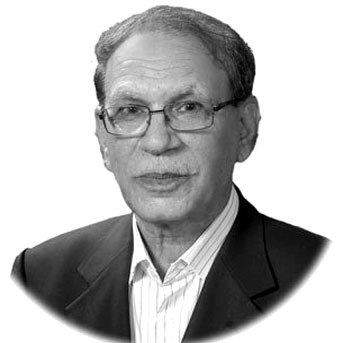Mohammad Jamil
AFTER disintegration of the (erstwhile) Soviet Union, the Cold War era ended and allies of the Communist camp deemed it appropriate to have close relations with the US — the sole superpower. However, since late 1990s, China emerged as an important factor, as it has been able to achieve considerable influence over many Asian and African countries through generous grants and loans for their development. It was in this backdrop that changes have been taking place in interstate relations. Of course, every country is formulating its foreign policy on the basis of its national interest. As recently as on Thursday, US President Donald Trump announced “Israel and the United Arab Emirates agreed to normalize relations”. A joint statement by US President Donald Trump, Israeli PM Benjamin Netanyahu and Abu Dhabi Crown Prince Mohammed Al Nahyan said they hoped the historic breakthrough would advance peace in the Middle East.
The pursuit of national interest vis-à-vis security and development is the main driver of the foreign policy of any country, and when it feels that its national interest is not served, the change in policy takes place. Pakistan came into being in 1947, and being a nascent state was cash-starved, as India had refused to give Pakistan’s share. It needed help for development and strengthening defence because of hostile neighbour, which had occupied Jammu and Kashmir by force. It was in this backdrop that in 1954 Pakistan signed the Mutual Defence Assistance Agreement with the United States. In that year, it became a member of SEATO, and in 1955 it joined the Baghdad Pact. In 1958, when Iraq left this pact after the revolution, it was renamed CENTO comprising Turkey, Iran and Pakistan as its regional members. Pakistan and Iran had cordial relations till Shah of Iran’s ouster.
In 1959, Pakistan signed (as did Turkey and Iran) a bilateral Agreement of Cooperation with the United States, which was designed further to reinforce the defensive purposes of CENTO. Thus Pakistan was allied with the United States through four mutual security arrangements; and had earned the Soviet Union’s ire after the U-2 spy plane took off from Budaber base Peshawar, which was shot down on May 1, 1960. Despite honouring its commitments under the agreements, Pakistan had seen many American betrayals, embargoes and sanctions; and every time the US achieved its objective, it ditched Pakistan. During 1965 War, the US stopped its military aid to Pakistan; yet Pakistan became a frontline state when the Soviets occupied Afghanistan in late 1970s. American foreign policy abruptly changed after the Soviet forces withdrew from Afghanistan and the US started forcing Pakistan to abandon its nuclear program and sign NPT.
During the first Gulf War in 1991, Pakistan was asked by the US and Saudi Arabia to join the coalition against Iraq, but Pakistan refused to join it. However, Pakistan had deployed two divisions to defend holy sites and to protect territorial integrity of Saudi Arabia. In March 2015, official Saudi press agency had stated that Pakistan, along with Egypt, Jordan, Morocco and Sudan, had expressed a desire to participate in the operation against rebels (Houthis) in Yemen. The matter was discussed in Parliament and the then Federal Defence Minister Khawaja Asif had told the National Assembly that “Pakistan has only pledged to safeguard the territorial integrity of Saudi Arabia on Saudi request. We will not take part in any conflict that could result in differences in the Muslim world, causing fault lines present in Pakistan to be disturbed.”
Saudi Arabia and the UAE appeared to have been annoyed over Pakistan’s decision of not becoming part of any conflict between the Muslim countries, and they made certain moves that upset Pakistan. Saudi Arabia was the first Islamic country which bestowed the highest civilian award – King Abdulaziz Sash to Narendra Modi in April 2016. UAE also bestowed the highest UAE Award on Indian Prime Minister Narendra Modi. Indeed, every country has the right to have strategic or business relations with other countries keeping in view its national interest. And Pakistan considers the core issue of Kashmir as national interest, and even for billions of dollars grant or loans it will not compromise. Last year, Foreign Minister Shah Mahmood Qureshi had refused to attend OIC’s Council of Foreign Ministers meeting because Indian Foreign Minister Sushma Swaraj was invited as chief guest in the opening session to deliver keynote address.
He had said: “India wanted to use the OIC platform to further its own agenda, which it will do by way of first becoming an observer and then gradually forcing its way in to exert more influence on member nations”. The world knows that Kashmiris are being subjected to repression, murder in fake encounters and rapes by Indian forces; but because of India’s 1.3 bn population and a large market, the US and the western countries turn a blind eye to human rights violations in the IoK. But the fact remains that the OIC was established to support every member country in the case of aggression; thus Pakistan had requested the OIC to convene the meeting of Council of Foreign Ministers of OIC on the situation in Kashmir, but Saudi Arabia was reluctant, and meeting could not be convened.
There is a perception that Saudi Arabia and Pakistan are destined to have strong fraternal ties and over time will be back to normal. Anyhow many changes are taking place in the region. China has entered into agreement with Iran for development of Chabahar Port and also Railways and other projects. Nepal has retaliated to India by including disputed areas in the Map. Sri Lanka and Maldives are also likely to resist the expansionist policy of India. As regards Pakistan, there was a paradigm shift in Pakistan’s foreign policy in 2015 when it signed CPEC with China.
—The writer is a senior journalist based in Lahore.










